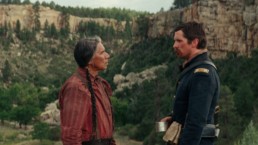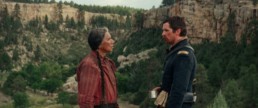‘Hostiles’ Review: Christian Bale’s Western Is Heroic Journey Towards Respect
We are all Hostiles, and the world is built on principles that divide us.
This review originally ran on November 28th during the AFI Film Festival
Director Scott Cooper has been a Hollywood fringe favorite since the release of his first film Crazy Heart cashed in on a career Oscar for Jeff Bridges.
Four films later, he’s proven himself to be an actor’s favorite and a lover of brooding masculine movies that flirt with awards prospects, but – aside from his first – never land that punch. Hostiles, true to form, arrived at Telluride Film Festival this year without distribution and barely found some in time to build an Oscar campaign for its star, Christian Bale, and perhaps the rest of the film.
In the late 19th century, a U.S. government mercenary in New Mexico, Captain Joseph J. Blocker (Christian Bale), is given the task of escorting his nemesis, Chief Yellow Hawk (Wes Studi), to his homeland in Montana for him to die peacefully. As someone who has made a career hunting Indians, he’s less than thrilled. From there, the film is a journey as a party comprised of soldiers and American Indians makes their way North. From the title, the theme is made clear: we are all “hostiles,” and the world is built on principles that divide us.
Unsurprisingly, the film’s character arc is Bale becoming less of a villain and more sympathetic to his rival. The film is conscious of the genocidal treatment of Indians and never shies away from violence in every direction. It’s a Western that is built on many traditional principles, but the effect of the seemingly endless violence in the film eventually starts to work– aiming to erode the viewer to exhaustion to realize how damaging bloodshed truly is. In this sense, the film is more effective than enjoyable. It’s not a particularly groundbreaking entry, and yet is coherently made and becomes increasingly engaging toward the end.
It’s a Western that is built on many traditional principles, but the effect of the seemingly endless violence in the film eventually starts to work– aiming to erode the viewer to exhaustion to realize how damaging bloodshed truly is.
The biggest critique is that for a film that touts itself as progressive, the white characters are given much more dimension than their American Indian counterparts. One phenomenal actor, Adam Beach, is practically mute in the film, while almost all the white soldiers are given brooding, complex monologues and backstories. In fact, the supporting cast that is given ample screen time all shine. For example, Rory Cochrane (Dazed and Confused) is given a monologue midway through the movie about the overwhelming amount of violence and murder his character has committed and the toll it has taken on him. It’s a great acting showcase, and I wish the film had found the time for Wes Studi, Adam Beach, and Q’orianka Kilcher to get the same treatment as Ben Foster, Jesse Plemons, Rosamund Pike, and the aforementioned Cochrane. I don’t mind having Christian Bale as the protagonist, but the movie could have benefitted from a less lopsided view of the supporting cast.
Overall, Hostiles represents one of the darkest and more internal films of Scott Cooper’s filmography, and from my perspective, this is where he works best. He knows how to get the most out of his performers and addresses great themes in the midst of the larger story. I imagine his work can only get better and more refined from here. For those who have enjoyed Cooper’s previous films, Hostiles will indeed be a satisfying film to check out.
127 minutes. ‘Hostiles’ is rated R for strong violence, and language. Now playing at AMC Century City 15.
H. Nelson Tracey
Nelson is a film director and editor from Denver based in Los Angeles. In addition to writing for Cinemacy, he has worked on multiple high profile documentaries and curates the YouTube channel "Hint of Film." You can check out more of his work at his website, hnelsontracey.com


